formerly eScholarship Editions


|
|
|
|
Your search for
"Philosophy"
in subject
and
Public
in rights
found 79 book(s). | Modify Search | Displaying 61 - 79 of 79 book(s) | |
| 61. | 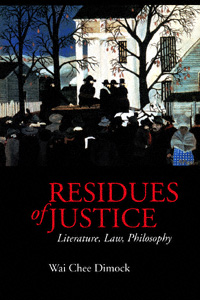 | Title: Residues of justice: literature, law, philosophy Author: Dimock, Wai-chee 1953- Published: University of California Press, 1996 Subjects: Literature | Literary Theory and Criticism | American Studies | Law | Philosophy Publisher's Description: In this arresting book, Wai Chee Dimock takes on the philosophical tradition from Kant to Rawls, challenging its conception of justice as foundational, self-evident, and all-encompassing. The idea of justice is based on the premise that the world can be resolved into commensurate terms: punishment equal to the crime, redress equal to the injury, benefit equal to the desert. Dimock focuses, however, on what remains unexhausted, unrecovered, and noncorresponding in the exercise of justice. To honor these "residues," she turns to literature, which, in its linguistic density, transposes the clean abstractions of law and philosophy into persistent shadows, the abiding presence of the incommensurate. Justice can only be a partial answer to the phenomenon of human conflict.In arguing for justice as an incomplete virtue, Dimock draws upon legal history, political philosophy, linguistics, theology, and feminist theory; she discusses Aristotle and Augustine, Locke and Luther, Marx and Durkheim, Michael Sandel and Carol Gilligan, Noam Chomsky and Mary Ann Glendon. She also examines an unusual configuration of nineteenth-century American authors, pairing figures such as Herman Melville and Rebecca Harding Davis, Walt Whitman and Susan Warner.The result is a book both passionate and scholarly. It invites us to rethink the meanings of literature, law, and philosophy, and to imagine a language of community more supple and more nuanced than the language of justice. [brief] Similar Items |
| 62. | 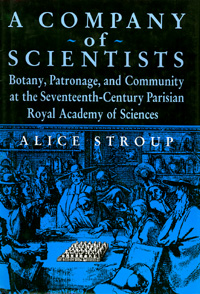 | Title: A company of scientists: botany, patronage, and community at the Seventeenth-century Parisian Royal Academy of Sciences Author: Stroup, Alice Published: University of California Press, 1990 Subjects: History | History and Philosophy of Science | European History Publisher's Description: Who pays for science, and who profits? Historians of science and of France will discover that those were burning questions no less in the seventeenth century than they are today. Alice Stroup takes a new look at one of the earliest and most influential scientific societies, the Académie Royale des Sciences. Blending externalist and internalist approaches, Stroup portrays the Academy in its political and intellectual contexts and also takes us behind the scenes, into the laboratory and into the meetings of a lively, contentious group of investigators.Founded in 1666 under Louis XIV, the Academy had a dual mission: to advance science and to glorify its patron. Creature of the ancien régime as well as of the scientific revolution, it depended for its professional prestige on the goodwill of monarch and ministers. One of the Academy's most ambitious projects was its illustrated encyclopedia of plants. While this work proceeded along old-fashioned descriptive lines, academicians were simultaneously adopting analogical reasoning to investigate the new anatomy and physiology of plants. Efforts to fund and forward competing lines of research were as strenuous then as now. We learn how academicians won or lost favor, and what happened when their research went wrong. Patrons and members shared in a new and different kind of enterprise that may not have resembled the Big Science of today but was nevertheless a genuine "company of scientists." [brief] Similar Items |
| 63. |  | Title: Averting catastrophe: strategies for regulating risky technologies Author: Morone, Joseph G Published: University of California Press, 1988 Subjects: Environmental Studies | History and Philosophy of Science | Politics Publisher's Description: Chernobyl, Bhopal, and Love Canal are symbols of the potentially catastrophic risks that go hand in hand with much modern technology. This volume is a non-partisan study of the imperfect but steadily developing system for containing the risks of such technologies as chemicals, nuclear power, and gen . . . [more] Similar Items |
| 64. | 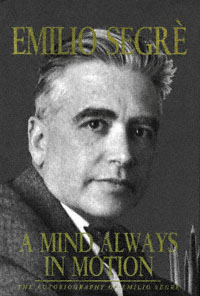 | Title: A mind always in motion: the autobiography of Emilio Segrè Author: Segrè, Emilio Published: University of California Press, 1993 Subjects: Science | History and Philosophy of Science | Physics | Autobiography Publisher's Description: The renowned physicist Emilio Segrè (1905-1989) left his memoirs to be published posthumously because, he said, "I tell the truth the way it was and not the way many of my colleagues wish it had been." This compelling autobiography offers a personal account of his fascinating life as well as candid portraits of some of this century's most important scientists, such as Enrico Fermi, E. O. Lawrence, and Robert Oppenheimer.Born in Italy to a well-to-do Jewish family, Segrè showed early signs of scientific genius - at age seven he began a notebook of physics experiments. He became Fermi's first graduate student in 1928 and contributed to the discovery of slow neutrons, and later was appointed director of the physics laboratory at the University of Palermo. While visiting the Radiation Laboratory at Berkeley in 1938, he learned that he had been dismissed from his Palermo post by Mussolini's Fascist regime. Lawrence then hired him to work on the cyclotron at Berkeley with Luis Alvarez, Edwin McMillan, and Glenn Seaborg. Segrè was one of the first to join Oppenheimer at Los Alamos, where he became a group leader on the Manhattan Project. His account of that mysterious enclave of scientists, all working feverishly to develop the atomic bomb before the Nazis did, includes his description of the first explosion at Alamogordo.Segrè writes movingly of the personal devastation wrought by the Nazis, his struggles with fellow scientists, and his love of nature. His book offers an intimate glimpse into a bygone era as well as a unique perspective on some of the most important scientific developments of this century. [brief] Similar Items |
| 65. | 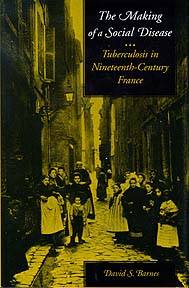 | Title: The making of a social disease;: tuberculosis in nineteenth-century France Author: Barnes, David S Published: University of California Press, 1995 Subjects: History | History and Philosophy of Science | Medicine | European History Publisher's Description: In this first English-language study of popular and scientific responses to tuberculosis in nineteenth-century France, David Barnes provides a much-needed historical perspective on a disease that is making an alarming comeback in the United States and Europe. Barnes argues that French perceptions of the disease - ranging from the early romantic image of a consumptive woman to the later view of a scourge spread by the poor - owed more to the power structures of nineteenth-century society than to medical science. By 1900, the war against tuberculosis had become a war against the dirty habits of the working class.Lucid and original, Barnes's study broadens our understanding of how and why societies assign moral meanings to deadly diseases. [brief] Similar Items |
| 66. |  | Title: Abuses Author: Lingis, Alphonso 1933- Published: University of California Press, 1994 Subjects: Philosophy | Literature | Cultural Anthropology | Social and Political Thought | Psychology | Travel Publisher's Description: Part travelogue, part meditation, Abuses is a bold exploration of central themes in Continental philosophy by one of the most passionate and original thinkers in that tradition writing today.A gripping record of desires, obsessions, bodies, and spaces experienced in distant lands, Alphonso Lingis's book offers no less than a new approach to philosophy - aesthetic and sympathetic - which departs from the phenomenology of Levinas and Merleau-Ponty. "These were letters written to friends," Lingis writes, "from places I found myself for months at a time, about encounters that moved me and troubled me. . . . These writings also became no longer my letters. I found myself only trying to speak for others, others greeted only with passionate kisses of parting."Ranging from the elevated Inca citadel of Machu Picchu, to the living rooms of the Mexican elite, to the streets of Manila, Lingis recounts incidents of state-sponsored violence and the progressive incorporation of third-world peoples into the circuits of exchange of international capitalism. Recalling the work of such writers as Graham Greene, Kathy Acker, and Georges Bataille, Abuses contains impassioned accounts of silence, eros and identity, torture and war, the sublime, lust and joy, and human rituals surrounding carnival and death that occurred during his journeys to India, Bangladesh, Thailand, Bali, the Philippines, Antarctica, and Latin America. A deeply unsettling book by a philosopher of unusual imagination, Abuses will appeal to readers who, like its author, "may want the enigmas and want the discomfiture within oneself." [brief] Similar Items |
| 67. | 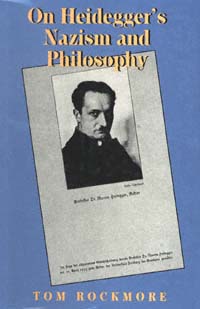 | Title: On Heidegger's Nazism and philosophy Author: Rockmore, Tom 1942- Published: University of California Press, 1991 Subjects: Philosophy | Social and Political Thought | German Studies | Intellectual History Publisher's Description: That Martin Heidegger supported National Socialism has long been common knowledge. Yet the relation between his philosophy and political commitments remains highly contentious and recently has erupted into a vociferous debate. Boldly refuting arguments that the philosopher's political stance was accidental or adopted under coercion, Rockmore argues that Heidegger's philosophical thought and his Nazism are inseparably intertwined, that he turned to National Socialism on the basis of his philosophy, and that his later evolution is largely determined by his continuing concern with Nazism.After developing a framework that clearly outlines the interrelation of Nazism and Heidegger's philosophy, Rockmore analyzes the famous rectoral address the philosopher delivered in 1933 upon becoming rector of the University of Freiburg. In that speech Heidegger sought to ground politics in philosophy. Rockmore examines the inseparable relation of politics and philosophy in Heidegger's Being and Time , the recently published Contributions to Philosophy (written from 1936 to 1938), and the interpretations of Hölderlin, Nietzsche, and technology.In his conclusion Rockmore considers the ongoing discussion of Heidegger's thought and Nazism in France. Combining extensive documentation of the Heidegger controversy with philosophical and historical analysis, this book raises profound questions about the social and political responsibility of philosophy. [brief] Similar Items |
| 68. | 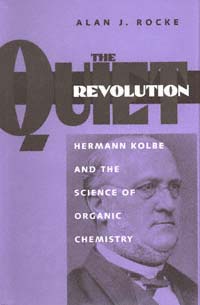 | Title: The quiet revolution: Hermann Kolbe and the science of organic chemistry Author: Rocke, Alan J 1948- Published: University of California Press, 1993 Subjects: Science | History and Philosophy of Science | Physical Sciences | European History Publisher's Description: Organic chemist Hermann Kolbe (1818-1884) is the subject of this vigorously contextualized biography, which combines the approaches of cognitive and social history of science. Kolbe was one of the most outstanding chemists during the remarkable period in which German science, like the wider manifestations of German industrial and political power, rose to a position of world dominance.Rocke portrays Kolbe as a leading actor in the transformation of the institutional and pedagological dimensions of the physical sciences, as well as in the rapid growth of technologically powerful pure sciences. In all these areas there was a sharp inflection point around 1860 when, as Rocke persuasively argues, the primary discipline in the drama was organic chemistry. [brief] Similar Items |
| 69. | 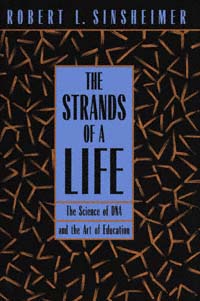 | Title: The strands of a life Author: Sinsheimer, Robert Published: University of California Press, 1994 Subjects: Science | Biology | History and Philosophy of Science | Autobiographies and Biographies Publisher's Description: From heading a campus of the largest public university in the nation to participating in the birth of molecular biology, Robert L. Sinsheimer's experiences have given him a unique vantage point from which to view the paths that science and education have taken in the twentieth century. This book tells the story of his life, of his own growth, and of his leading role in both science and higher learning during the past fifty years.Robert L. Sinsheimer's experiences have given him a unique vantage point from which to view the paths that science and education have taken in the twentieth century. He has witnessed and participated in the birth of molecular biology, taught at leading universities, and headed a campus of the largest public university in the nation. This book tells the story of his life, of his own growth, and of his leading role in both science and higher learning during the past fifty years.While a student and then a researcher at MIT, and as a professor at Iowa State University and later at Caltech, Sinsheimer was a major participant in the "molecular revolution" that radically transformed the science of life. He was also one of the first to foresee the potential of molecular biology and to draw attention to some of the ethical quandaries the new science would pose.In 1977 Sinsheimer became chancellor at the University of California, Santa Cruz, at a crucial time in the campus's evolution. He played a key part in revitalizing the educational experiment that has made the campus unique among the state's institutions of higher learning.Sinsheimer's life has been lived at the ever-advancing edge of knowledge. In simple, elegant language, he offers historical and philosophical insights into the world of science and the mind of a scientist. His reflections are both fascinating and valuable. [brief] Similar Items |
| 70. | 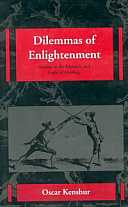 | Title: Dilemmas of enlightenment: studies in the rhetoric and logic of ideology Author: Kenshur, Oscar 1942- Published: University of California Press, 1993 Subjects: Philosophy | Social and Political Thought | Literary Theory and Criticism | European History Publisher's Description: Oscar Kenshur combines trenchant analyses of important early-modern texts with a powerful critique of postmodern theories of ideology. He thereby contributes both to our understanding of Enlightenment thought and to contemporary debates about cultural studies and critical theory.While striving to resolve "dilemmas" occasioned by conflicting intellectual and political commitments, seventeenth- and eighteenth-century writers often relied upon ideas originally used by their enemies to support very different claims. Thus, they engaged in what Kenshur calls "intellectual co-optation." In exploring the ways in which Dryden, Bayle, Voltaire, Johnson, and others used this technique, Kenshur presents a historical landscape distinctly different from the one constructed by much contemporary theory. [brief] Similar Items |
| 71. | 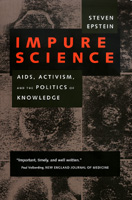 | Title: Impure science: AIDS, activism, and the politics of knowledge Author: Epstein, Steven Published: University of California Press, 1996 Subjects: Social Science | Medicine | Public Policy | History and Philosophy of Science | Sociology Publisher's Description: In the short, turbulent history of AIDS research and treatment, the boundaries between scientist insiders and lay outsiders have been crisscrossed to a degree never before seen in medical history. Steven Epstein's astute and readable investigation focuses on the critical question of "how certainty is constructed or deconstructed," leading us through the views of medical researchers, activists, policy makers, and others to discover how knowledge about AIDS emerges out of what he calls "credibility struggles."Epstein shows the extent to which AIDS research has been a social and political phenomenon and how the AIDS movement has transformed biomedical research practices through its capacity to garner credibility by novel strategies. Epstein finds that nonscientist AIDS activists have gained enough of a voice in the scientific world to shape NIH?sponsored research to a remarkable extent. Because of the blurring of roles and responsibilities, the production of biomedical knowledge about AIDS does not, he says, follow the pathways common to science; indeed, AIDS research can only be understood as a field that is unusually broad, public, and contested. He concludes by analyzing recent moves to democratize biomedicine, arguing that although AIDS activists have set the stage for new challenges to scientific authority, all social movements that seek to democratize expertise face unusual difficulties.Avoiding polemics and accusations, Epstein provides a benchmark account of the AIDS epidemic to date, one that will be as useful to activists, policy makers, and general readers as to sociologists, physicians, and scientists. [brief] Similar Items |
| 72. | 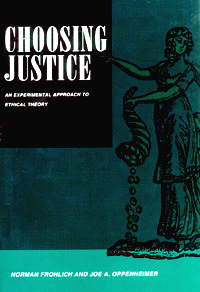 | Title: Choosing justice: an experimental approach to ethical theory Author: Frohlich, Norman Published: University of California Press, 1992 Subjects: Politics | Economics and Business | Philosophy | Political Theory | Social Theory | Ethics Similar Items |
| 73. | 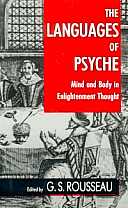 | Title: The Languages of psyche: mind and body in Enlightenment thought: Clark Library lectures, 1985-1986 Author: Rousseau, G. S. (George Sebastian) Published: University of California Press, 1991 Subjects: History | Medicine | History and Philosophy of Science | European History | European Literature Publisher's Description: The Languages of Psyche traces the dualism of mind and body during the "long eighteenth century," from the Restoration in England to the aftermath of the French Revolution. Ten outstanding scholars investigate the complex mind-body relationship in a variety of Enlightenment contexts - science, medicine, philosophy, literature, and everyday society. No other recent book provides such an in-depth, suggestive resource for philosophers, literary critics, intellectual and social historians, and all who are interested in Enlightenment studies. [brief] Similar Items |
| 74. | 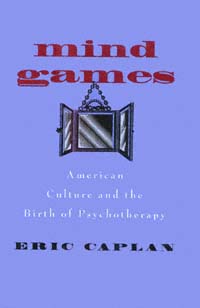 | Title: Mind games: American culture and the birth of psychotherapy Author: Caplan, Eric 1962- Published: University of California Press, 1998 Subjects: History | United States History | American Studies | Science | History and Philosophy of Science Publisher's Description: Eric Caplan's fascinating exploration of Victorian culture in the United States shatters the myth of Freud's seminal role in the creation of American psychotherapy. Resurrecting the long-buried "prehistory" of American mental therapeutics, Mind Games tells the remarkable story of how a widely assorted group of actors - none of them hailing from Vienna or from any other European city - compelled a reluctant medical profession to accept a new role for the mind in medicine. By the time Freud first set foot on American soil in 1909, as Caplan demonstrates, psychotherapy was already integrally woven into the fabric of American culture and medicine.What came to be known as psychotherapy emerged in the face of considerable opposition, much - indeed most - of which was generated by the medical profession itself. Caplan examines the contentious interplay within the American medical community, as well as between American physicians and their lay rivals, who included faith-healers, mind-curists, Christian Scientists, and Protestant ministers. These early practitioners of alternative medicine ultimately laid the groundwork for a distinctive and much heralded American type of psychotherapy. Its grudging acceptance by both medical elites and rank and file physicians signified their understanding that reliance on physical therapies to treat nervous and mental symptoms compromised their capacity to treat - and compete - effectively in a rapidly expanding mental-medical marketplace. Mind Games shows how psychotherapy came to occupy its central position in mainstream American culture. [brief] Similar Items |
| 75. | 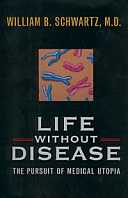 | Title: Life without disease: the pursuit of medical utopia Author: Schwartz, William B 1922- Published: University of California Press, 1998 Subjects: Science | Medicine | Economics and Business | History and Philosophy of Science | Public Policy Publisher's Description: The chaotic state of today's health care is the result of an explosion of effective medical technologies. Rising costs will continue to trouble U.S. health care in the coming decades, but new molecular strategies may eventually contain costs. As life expectancy is dramatically extended by molecular medicine, a growing population of the aged will bring new problems. In the next fifty years genetic intervention will shift the focus of medicine in the United States from repairing the ravages of disease to preventing the onset of disease. Understanding the role of genes in human health, says Dr. William B. Schwartz, is the driving force that will change the direction of medical care, and the age-old dream of life without disease may come close to realization by the middle of the next century. Medical care in 2050 will be vastly more effective, Schwartz maintains, and it may also be less expensive than the resource-intensive procedures such as coronary bypass surgery that medicine relies on today.Schwartz's alluring prospect of a medical utopia raises urgent questions, however. What are the scientific and public policy obstacles that must be overcome if such a goal is to become a reality? Restrictions on access imposed by managed care plans, the corporatization of charitable health care institutions, the increasing numbers of citizens without health insurance, the problems with malpractice insurance, and the threatened Medicare bankruptcy - all are the legacy of medicine's great progress in mastering the human body and society's inability to assimilate that mastery into existing economic, ethical, and legal structures. And if the average American life span is 130 years, a genuine possibility by 2050, what social and economic problems will result?Schwartz examines the forces that have brought us to the current health care state and shows how those same forces will exert themselves in the decades ahead. Focusing on the inextricable link between scientific progress and health policy, he encourages a careful examination of these two forces in order to determine the kind of medical utopia that awaits us. The decisions we make will affect not only our own care, but also the system of care we bequeath to our children. [brief] Similar Items |
| 76. |  | Title: Nerves and narratives: a cultural history of hysteria in nineteenth-century British prose Author: Logan, Peter Melville 1951- Published: University of California Press, 1997 Subjects: Literature | History | History and Philosophy of Science | Literary Theory and Criticism | Victorian History | English Literature | Women's Studies Publisher's Description: The British middle class of the early nineteenth century was defined by its nervous complaints - hysteria, hypochondria, vapours, melancholia, and other maladies. Peter Melville Logan explores the link between medical theories of nervous physiology and narrative issues central to the literary writing of the period. He examines the assumption, implicit in medical thinking at the time, that the nervous body - unlike its non-nervous counterpart - has a narrative inscribed on its nerve fibers. It becomes "the body with a story to tell."Logan takes up several literary works whose nervous narrators connect their present disorder with an unnatural, unhealthy social order. Concentrating on novels by Godwin, Hays, and Edgeworth, and on De Quincey's Confessions of an English Opium-Eater , Logan weaves cultural phenomena such as crowd psychology and attitudes toward opium addiction into the basic paradigm of the nervous narrative. He explains why these social critiques always tended to promote the same distempered civilization that brought them into being. He then looks at the emergence of the working-class body in the 1840s, changing medical theories, and George Eliot's treatment of medicine in Middlemarch .Logan's book is especially valuable for its rethinking of disciplinary categories that separate medicine from literature and for bringing to light lesser-known literary texts. With a foreword by Roy Porter, it will be a welcome addition to literary, gender, and cultural studies. [brief] Similar Items |
| 77. | 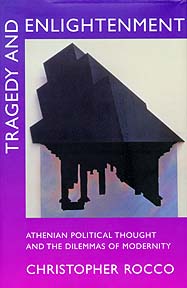 | Title: Tragedy and enlightenment: Athenian political thought, and the dilemmas of modernity Author: Rocco, Christopher 1958- Published: University of California Press, 1997 Subjects: Classics | Classical Philosophy | Classical History | Classical Literature and Language | Social and Political Thought | Social Theory Publisher's Description: Weaving together ancient Greek texts and postmodernist theory, Christopher Rocco addresses the debate between modernity and postmodernity that dominates contemporary theory. Interpreting Greek drama within a critical framework informed by contemporary theorists Foucault, Habermas, Horkheimer and Adorno, Tragedy and Enlightenment makes a sophisticated argument for the continuing relevance of the classical past, focusing on the subject of democracy.The starting point for Rocco's analysis is the impasse in contemporary political and cultural theory over the possibility and desirability of democracy in a postmodern world. After explaining the competing positions in the current debate, Rocco argues that ancient Greek tragedy and dialogue - specifically Sophocles' Oedipus , Plato's Republic and Gorgias , and Aeschylus' Oresteia - suggest alternate constructions for this and other postmodern problems.Rocco gives a detailed analysis of the contemporary divide over the theories of Jürgen Habermas and Michel Foucault and provides a provocative reading of Horkheimer and Adorno's Dialectic of Enlightenment. This original contribution to political and cultural discourse brings us to a new understanding of familiar texts and will alter the grounds of debate for students and scholars of the classical and the contemporary worlds. [brief] Similar Items |
| 78. |  | Title: The king's midwife: a history and mystery of Madame du Coudray Author: Gelbart, Nina Rattner Published: University of California Press, 1998 Subjects: History | European History | Women's Studies | Autobiographies and Biographies | French Studies | History and Philosophy of Science | Medicine Publisher's Description: This unorthodox biography explores the life of an extraordinary Enlightenment woman who, by sheer force of character, parlayed a skill in midwifery into a national institution. In 1759, in an effort to end infant mortality, Louis XV commissioned Madame Angélique Marguerite Le Boursier du Coudray to travel throughout France teaching the art of childbirth to illiterate peasant women. For the next thirty years, this royal emissary taught in nearly forty cities and reached an estimated ten thousand students. She wrote a textbook and invented a life-sized obstetrical mannequin for her demonstrations. She contributed significantly to France's demographic upswing after 1760.Who was the woman, both the private self and the pseudonymous public celebrity? Nina Rattner Gelbart reconstructs Madame du Coudray's astonishing mission through extensive research in the hundreds of letters by, to, and about her in provincial archives throughout France. Tracing her subject's footsteps around the country, Gelbart chronicles du Coudray's battles with finance ministers, village matrons, local administrators, and recalcitrant physicians, her rises in power and falls from grace, and her death at the height of the Reign of Terror. At a deeper level, Gelbart recaptures du Coudray's interior journey as well, by questioning and dismantling the neat paper trail that the great midwife so carefully left behind. Delightfully written, this tale of a fascinating life at the end of the French Old Regime sheds new light on the histories of medicine, gender, society, politics, and culture. [brief] Similar Items |
| 79. | 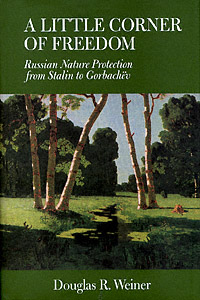 | Title: A little corner of freedom: Russian nature protection from Stalin to Gorbachëv Author: Weiner, Douglas R 1951- Published: University of California Press, 1999 Subjects: Russian and Eastern European Studies | Environmental Studies | Politics | History | History and Philosophy of Science | Ecology Publisher's Description: While researching Russia's historical efforts to protect nature, Douglas Weiner unearthed unexpected findings: a trail of documents that raised fundamental questions about the Soviet political system. These surprising documents attested to the unlikely survival of a critical-minded, scientist-led movement through the Stalin years and beyond. It appeared that, within scientific societies, alternative visions of land use, resrouce exploitation, habitat protection, and development were sustained and even publicly advocated. In sharp contrast to known Soviet practices, these scientific societies prided themselves on their traditions of free elections, foreign contacts, and a pre-revolutionary heritage.Weiner portrays nature protection activists not as do-or-die resisters to the system, nor as inoffensive do-gooders. Rather, they took advantage of an unpoliced realm of speech and activity and of the patronage by middle-level Soviet officials to struggle for a softer path to development. In the process, they defended independent social and professional identities in the face of a system that sought to impose official models of behavior, ethics, and identity for all. Written in a lively style, this absorbing story tells for the first time how organized participation in nature protection provided an arena for affirming and perpetuating self-generated social identities in the USSR and preserving a counterculture whose legacy survives today. [brief] Similar Items |